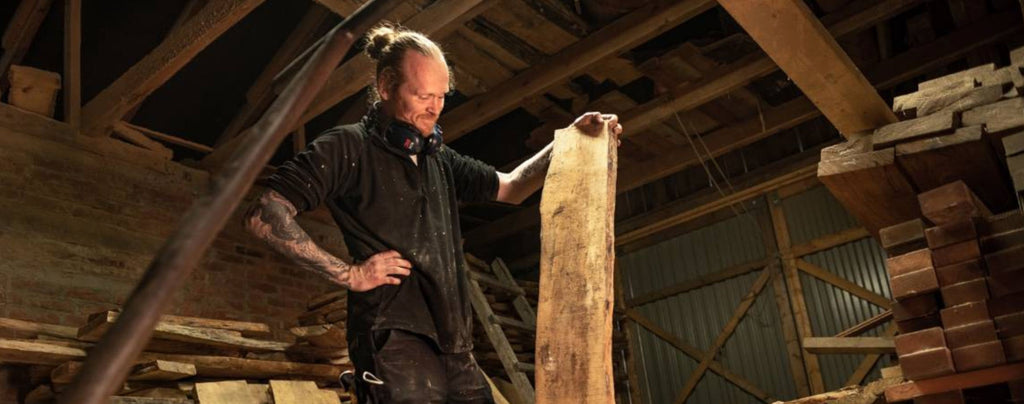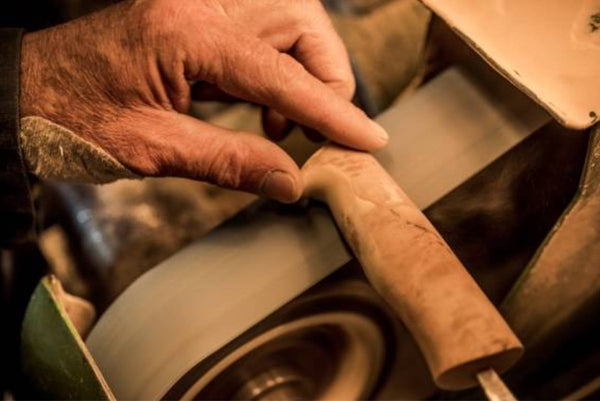Wood and steel

WOOD & STEEL
Helle focus on maintaining the use of traditional methods and traditional materials, with some modern influences to improve the overall usability or manage heavy work that can potentially harm our craftsmen and women.
At Helle, we look at time differently. Investing in allowing the product to become unique is more important. Understanding the natural materials and how they change depending on method, treatment and design. Allowing things to take the time needed to reach the strength and aesthetics necessary for our knives.
WOOD

We use different sources of wood for our handles. Most common in the Helle line is Curly Birch, but we also use Oak, Beech and other materials sourced from Scandinavian forests.
Curly Birch is known for its distinct patterns created due to a genetic variety in the Birch tree. The pattern gives each knife a unique look and not one knife is ever exactly the same as the other. This also means that each batch we receive needs to be treated individually too.
Allowing the time and understanding of the wood is essential when making handles. Each step of the process is equally important. We store all wood for a minimum of one year in cold storage to allow the wood to dry slowly. Only when the wood has reached a specific humidity, we cut it in pieces for the next step in the drying process.
After shaping each of the handles, we allow the handle to soak in linseed oil for several days before leftover oil is dried off in our tumbling whisky barrel (photo) and the handle and blade are joined. After assembly we hand sand the handle to its finished shape and polish the handle to a satin finish using natural lwax. All knives have different methods and process but at the start they are all equal. Some knives have up to 50 steps in the process from wood to finished knife.
Allowing things to take the time to be done right makes a lot of difference in the knifes appearance and how it will age with dignity. It is also a process that we think gives each knife a piece of the Helle spirit and gives the owner a greater appreciation knowing the level of commitment and craftmanship that goes in to each and every Helle knife.
We do not use any synthetic or chemical stabilization in the wood. All material used such as oil and wax are made from natural resources.
The only wood that isn’t just wood is Kebony, but rather a treatment making Scandinavian staple wood harder and providing it with the treasured dark hue of exotic wood. The processed we call kebonization is developed and patented in Norway using Furfury alcohol from waste biomass. When infused in the wood, it strengthens the cell wall by 50%. The result is a dark finish similar with teak and rosewood. If treated regularly with oil it will remain dark and if left untreated it will turn grey and get an aged look.
Antler from reindeer is sourced ecologically from after the deer shed their horns naturally. Then once a year they are gathered from the ground. The process is quite time-consuming, and the source is limited, but we believe in maintaining this balance.
STEEL

Helle developed a unique triple laminated steel in the late 60’s. A steel we have then improved through the years to become the steel we use today. Our steel comes in two versions: Stainless H3LSS and Carbon H3LCA.
The Helle triple laminated stainless steel offer a super sharp edge right out of the box. The core steel containing a higher grade of carbon giving that unique edge and still having a corrosion resistance surface as protection.
Triple laminated steel comes in two versions. One is more corrosion resistant the H3LSS and the other is Carbon steel H3LCA.
We also use Alleima (formely Sandvik) 12C27 and 14C28N in many of our products. Especially for products for tougher conditions close to the ocean for its corrosion resistance and durability.
We use high grade European quality leather. All production of sheaths like cutting sewing is done at the Helle Factory in Holmedal to meet the Helle standard.
LEATHER

All leather products are designed and made in-house at Helle, using high quality leather for selected partners.
The making of a sheath are just like the product they are aimed to protect and carry a process of many stages. Cutting the shape, imprint a pattern, dying the edges, gluing, sewing and shaping.
Finally fitting the new sheath with its knife makes the product complete.
